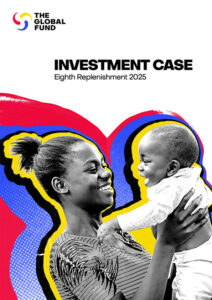The Tipping Point: Why the Global Fund’s 8th Replenishment Must Be a Wake-Up Call for Africa’s Health Sovereignty
- May 19, 2025
- Africa / Funding / Global Health / Global Health Initiatives / Lusaka Agenda
- By Fassika Alemayehu
The Tipping Point: Why the Global Fund’s 8th Replenishment Must Be a Wake-Up Call for Africa’s Health Sovereignty
Over the past two decades, the Global Fund partnership has achieved what once seemed impossible: saving 65 million lives and reducing the combined death rate from HIV, tuberculosis, and malaria by 63%. These are not just statistics, they represent generations of Africans who have been given a second chance at life.
But today, we stand at a critical juncture. The 8th Replenishment of the Global Fund is not just a fundraising event; it is a referendum on our collective commitment to global health equity, resilience, and sustainability.
The Global Fund is calling for US$18 billion to continue its lifesaving work from 2027 to 2029. With that investment, we could save 23 million more lives, avert 400 million infections, and reduce the mortality rate from these three diseases by another 64%. But this is not guaranteed. The current financial climate marred by inflation, debt stress, and shrinking aid budgets poses real risks to these ambitions. Flatlining contributions will stall progress and, worse, could reverse hard-won gains.
For Africa, the implications are even more sobering. While the Global Fund remains one of the most impactful vehicles for delivering health outcomes, its 8th Replenishment must also serve as a wake-up call for bold action toward health sovereignty. The stark truth is that Africa is not yet in control of its own health destiny.
Despite commitments like the Abuja Declaration, where African nations pledged to allocate at least 15% of national budgets to health — only two out of 55 countries have met this target. The average African health minister is expected to deliver for citizens on just $40 per capita a fraction of what their counterparts in high-income countries command. Meanwhile, concessional financing has plummeted, commercial debt is rising, and health budgets are being squeezed by debt repayments and fiscal austerity.
While the path to domestic resource mobilization and health system self-reliance remains a priority, these aspirations cannot be achieved overnight especially amid mounting economic pressures. Now more than ever, global solidarity from institutions like the Global Fund is essential to sustain life-saving interventions and preserve decades of gains. A robust 8th Replenishment is not a contradiction to African self-reliance; it is a bridge to it.
We cannot continue to rely on external lifelines indefinitely. Donor fatigue and shifting geopolitical priorities are not theoretical risks, they are unfolding realities. And the cracks in the global health architecture, exposed during COVID-19 demand a new model: one where African governments lead, communities are empowered, and external partners align behind locally defined priorities.
This shift is already in motion. The Lusaka Agenda, championed by African institutions such as the African Union, Africa CDC, WHO AFRO, and the Africa Constituency Bureau (ACB) — and supported by Global Health Initiatives calls for five bold shifts that will reshape global health engagement on the continent:
- Stronger contributions to primary health care
- Catalyzing domestic financing
- Joint approaches to equity
- Greater strategic and operational coherence among global health initiatives
- Coordinated action on R&D and regional manufacturing
While the Global Fund is urging countries to integrate and re-prioritize existing grants under Grant Cycle 7 with a renewed focus on ministries of health and community actors our constituencies (ESA/WCA) emphasized during the May 2025 Board meeting that this reprioritization must be driven by national priorities, not predefined by the Secretariat. Looking ahead to Grant Cycle 8, even greater alignment, efficiency, and accountability will be required but this must be grounded in country ownership and contextual realities.
But adaptation must not be confused with abdication. African leaders must step up not only to champion the 8th Replenishment but to embed its success within a broader strategy for health sovereignty. This includes innovative financing, better budget execution, stronger governance, and building institutions that can withstand future shocks.
Earlier this year, President Kagame convened a High-Level Conference on Domestic Health Financing in Addis Ababa. One of the key outcomes was a mandate for Africa CDC to develop a framework for sustainable health financing. These are the kinds of bold moves we need but they must be backed by political will, policy reform, and people-centered investments.
The Global Fund’s 8th Replenishment campaign is in full swing, co-hosted by South Africa and the United Kingdom. The numbers are important US$18 billion, 23 million lives, and a return on investment (ROI) of 1:19 meaning that for every dollar invested, nineteen dollars’ worth of health and economic benefits are generated.
But the stakes are even higher. If we do this right, we can not only defeat three of the world’s deadliest diseases; we can also lay the foundation for a new era of African-led, African-owned health systems.
This is a defining moment. Let us not just give generously but give strategically in support of African-led, African-owned health systems that can outlast crises and deliver for generations to come.